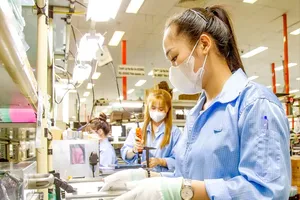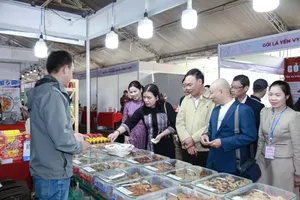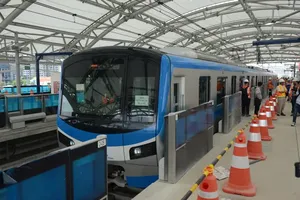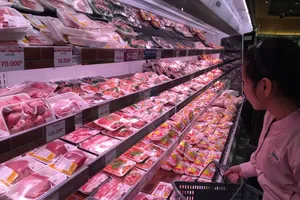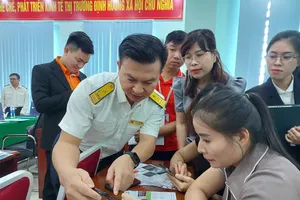According to the Trade Remedies Authority of Vietnam under the Ministry of Industry and Trade, by the end of the first quarter of this year, there were 22 cases of anti-tax evasion investigated by foreign countries on export goods of Vietnam, accounting for 12.6 percent of total trade remedy investigations on Vietnamese export products.
To have grounds to determine the focus of the fight against shirking trade remedies, the MoIT regularly updates the warning list of products that might be at risk of origin fraud, illegal transmission, and evasion of trade remedies. Currently, the list is updated until April this year with 12 products with high risks for authorities to base on it to handle these issues. The 12 products include hardwood plywood, foam cushions, wooden cabinets, artificial stone, tires of trucks and passenger cars, electric bicycles, copper pipes, steel joints, steel wheels, prefabricated steel, gas cylinders, and box staples that were mainly exported to the US and EU.
The ministries also recommended that the Vietnamese business community should strictly comply with regulations on the certificate of origin and should not abet origin frauds; at the same time, closely watch the market to timely inform authorities when there are signs of abnormalities to prevent manufacturing and export industries of Vietnam to be affected. Enterprises should be cautious in increasing capacity and investing massively, especially investment to serve export when depending on a sole market.
The EU-Vietnam Free Trade Agreement (EVFTA) is being reviewed and approved by the National Assembly, marking a major step of Vietnam in international economic integration. Including EVFTA, Vietnam has had 14 effective free trade agreements (FTAs), including new generation FTAs with the expectation of not only reducing taxes, but also developing investment, services, and science - technology. The tariff reduction has covered 80 percent of total import-export turnover and is an important economic driving force for the development of Vietnam.
Amid the context that many countries suffered economic recessions and decreases in import-export due to the Covid-19 pandemic, Vietnam still managed to maintain a trade surplus and import-export activities showed signs of recovery. However, amid unpredictable developments of the pandemic as well as the global economic situation in general, Vietnam needs to take drastic actions to support sustainable export, at the same time, monitor import, and avoid hurting domestic production.
To continue to ensure a fair competitive environment, remove difficulties for export barriers, and improve the capacity of the business community in the field of trade remedies, on May 19 this year, the MoIT issued the Decision No.1347/QD-BCT to implement a number of activities to support and enhance the safeguard capacity for domestic manufacturing industries.
The decision focuses on four groups of activities, including general and intensive training in the field of trade remedies for domestic manufacturing industries, especially for associations and business community; provide information on current trade remedies for domestic associations and manufacturing industries; complete the regulations on trade remedies that are efficient, streamline, and suitable with new developments; strengthen the implementation of regulations on trade remedies.
The activities to implement the decision are being urgently implemented this year to ensure that Vietnam's manufacturing industries and enterprises, especially small and medium-sized enterprises, have a firm grasp of safeguard measures to be able to protect their legitimate interests and improve the efficiency of the process of international economic integration.
To have grounds to determine the focus of the fight against shirking trade remedies, the MoIT regularly updates the warning list of products that might be at risk of origin fraud, illegal transmission, and evasion of trade remedies. Currently, the list is updated until April this year with 12 products with high risks for authorities to base on it to handle these issues. The 12 products include hardwood plywood, foam cushions, wooden cabinets, artificial stone, tires of trucks and passenger cars, electric bicycles, copper pipes, steel joints, steel wheels, prefabricated steel, gas cylinders, and box staples that were mainly exported to the US and EU.
The ministries also recommended that the Vietnamese business community should strictly comply with regulations on the certificate of origin and should not abet origin frauds; at the same time, closely watch the market to timely inform authorities when there are signs of abnormalities to prevent manufacturing and export industries of Vietnam to be affected. Enterprises should be cautious in increasing capacity and investing massively, especially investment to serve export when depending on a sole market.
The EU-Vietnam Free Trade Agreement (EVFTA) is being reviewed and approved by the National Assembly, marking a major step of Vietnam in international economic integration. Including EVFTA, Vietnam has had 14 effective free trade agreements (FTAs), including new generation FTAs with the expectation of not only reducing taxes, but also developing investment, services, and science - technology. The tariff reduction has covered 80 percent of total import-export turnover and is an important economic driving force for the development of Vietnam.
Amid the context that many countries suffered economic recessions and decreases in import-export due to the Covid-19 pandemic, Vietnam still managed to maintain a trade surplus and import-export activities showed signs of recovery. However, amid unpredictable developments of the pandemic as well as the global economic situation in general, Vietnam needs to take drastic actions to support sustainable export, at the same time, monitor import, and avoid hurting domestic production.
To continue to ensure a fair competitive environment, remove difficulties for export barriers, and improve the capacity of the business community in the field of trade remedies, on May 19 this year, the MoIT issued the Decision No.1347/QD-BCT to implement a number of activities to support and enhance the safeguard capacity for domestic manufacturing industries.
The decision focuses on four groups of activities, including general and intensive training in the field of trade remedies for domestic manufacturing industries, especially for associations and business community; provide information on current trade remedies for domestic associations and manufacturing industries; complete the regulations on trade remedies that are efficient, streamline, and suitable with new developments; strengthen the implementation of regulations on trade remedies.
The activities to implement the decision are being urgently implemented this year to ensure that Vietnam's manufacturing industries and enterprises, especially small and medium-sized enterprises, have a firm grasp of safeguard measures to be able to protect their legitimate interests and improve the efficiency of the process of international economic integration.







